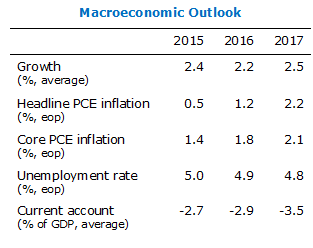USA: Concluding Statement of the IMF Mission
OREANDA-NEWS. The United States economy is, overall, in good shape. A total of 2.4 million new jobs were created over the past year and unemployment has fallen to 4.7 percent, its lowest level since the eve of the “Great Recession.” Inflation remains contained, and the U.S. economy has repeatedly demonstrated its resilience in the face of financial market volatility, a strengthening dollar, and subdued global demand.
Despite these important achievements, the U.S. faces potentially significant longer-term challenges to strong and sustained growth. Concerted policy actions are warranted, sooner rather than later. The latest IMF review of the U.S. economy—the 2016 Article IV Consultation—explores these policy challenges, focusing on the causes and consequences of falling labor force participation, an increasingly polarized income distribution, high levels of poverty, and weak productivity. The IMF’s staff recommends the following policy actions to alleviate these long-running supply side issues:
• Increase state and federal infrastructure investment.
• Adopt comprehensive skills-based immigration reform.
• Expand the Earned Income Tax Credit combined with an increase in the federal minimum wage.
• Upgrade social programs for the nonworking poor.
• Deepen and improve family-friendly benefits including paid family leave and childcare assistance.
• Increase funding for training programs, vocational partnerships, and early childhood education. Raise the effectiveness of spending on science, technology, engineering and mathematics programs.
• Comprehensively reform the corporate income tax.
• Ratify the Trans Pacific Partnership, conclude a trade and investment treaty with Europe, and resist all forms of protectionism.
Insofar as these measures require additional fiscal resources, they should be funded from new revenues or a reallocation of spending priorities and fit within a path for the fiscal deficit that ensures a steady decline in the public debt-to-GDP ratio.
1. 




Комментарии